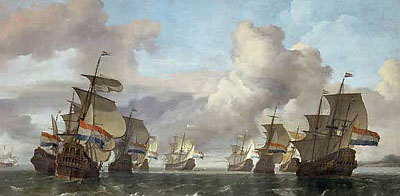I got distracted by a couple of other books last week, but yesterday I picked up A Splendid Exchange again and ran into a fascinating description of 17th century Dutch financial innovation that should sound eerily familiar to most of my readers. Working for the  Dutch East India Company during the spice trading era, it turns out, was so hideously dangerous that they had a desperate and continuous need for raw recruits to man their ships:
Dutch East India Company during the spice trading era, it turns out, was so hideously dangerous that they had a desperate and continuous need for raw recruits to man their ships:
This grisly recruitment effort was run by a specialized corps, composed mostly of women, the zielverkoopers (literally, “soul sellers”). Their marks were the young foreign men, mainly from Germany, who swarmed into Dutch cities seeking their fortune. In return for a cut of their signing advance and future pay from the Company, the women advertised room, board, and the sort of entertainments usually sought by unattached young men, during the weeks and months until they sailed for Asia.
….Holland being Holland, this Faustian transaction yielded a financial instrument, in this case the transportbrief — a marketable security entitling the zielverkooper to a cut of the recruit’s wages, paid by the Company as they were earned. Other investors then bought these securities at a discount that reflected the high death rate of VOC1 personnel and assembled them into profitable, diversified pools of human capital. These magnates were called, naturally enough, zielkoopers — buyers of souls. When, in the eighteenth century, the mortality among VOC’s soldiers and sailors soared because of lax Company procedures, many zielkoopers went bankrupt.
I imagine there were people in 17th century Amsterdam who objected to this practice. I also imagine there were 17th century equivalents of Angelo Mozilo making millions from it, 17th century equivalents of Alan Greenspan explaining how it made capital allocation more efficient, 17th century equivalents of CNBC shilling for it, 17th century equivalents of the Gaussian copula to convince everyone that pooling these securities made them safe, and 17th century equivalents of Phil Gramm to make sure nobody stopped it. The names may change, but the product remains the same.
1That is, Vereenigde Oost-Indische Compagnie, the Dutch phrase for United East Indian Company.








